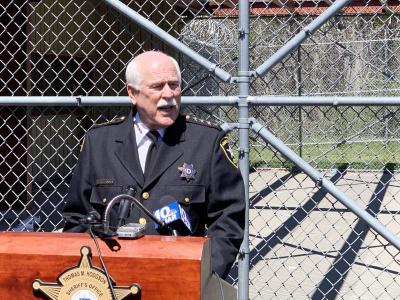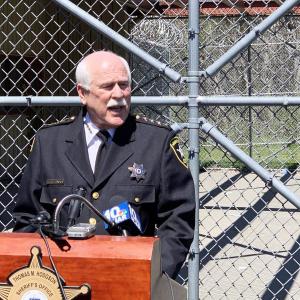Bristol County Sheriff settles $10 million ICE lawsuit for 2020 altercation
Bristol County Sheriff Paul Heroux settled a $10 million lawsuit that was brought against former Sheriff Thomas Hodgson and two federal agencies following an altercation that occurred at the now closed Immigrations and Customs Enforcement facility in May 2020.
Heroux settled the lawsuit for $800,000 without using taxpayer money, he said in a press release. The lawsuit was settled with money the Bristol County Sheriff's Office earned for performing civil process work, such as court authorized evictions for private parties.
The lawsuit was brought against Hodgson and two federal agencies in April 2022 by former immigration detainees who said excessive force was used during the 2020 altercation, which left three detainees in the hospital.
In the lawsuit, 16 former detainees claimed their fifth and eighth amendment rights were violated as they were denied due process and subjected to cruel and unusual punishments.
According to a December 2020 report from then Massachusetts Attorney General Maura Healey, 10 federal detainees had refused to consent to Covid testing and isolation due to fears that they would be exposed to the virus in the quarantine units.
Hodgson had then struggled with one of the detainees, which set off the larger confrontation that resulted in three detainees being sent to the hospital and $25,000 worth of damage to the now closed facility, the report said.
The Bristol County House of Corrections lost its contract with ICE in 2021 after an investigation into the altercation.
Heroux said that there were three possible outcomes of the lawsuit: winning in court, losing in court, or settling.
If he won, that would have ended the lawsuit, but if he lost then 17 employees who had been named as co-defendants could be held personally liable if not indemnified by the state, Heroux wrote in his press release.
He added that this could have been costly to the employees and their families.
“As the senior most administrator in this organization, that is not a large gamble I can take with my employees’ future,” Heroux wrote.
He also said that he didn’t want to “gamble with the taxpayers money.”
“If we were to lose, the plaintiffs could be awarded much more money than the amount the BCSO settled for,” Heroux wrote.
According to Heroux, the federal government said it wouldn’t pay for a settlement or assist in defending the sheriff’s office in court as the federal government believes that the office acted as a state office.
Meanwhile, the state government said that the sheriff’s office was acting on behalf of the federal government and therefore it would be the federal government that should pay the proposed settlements and defense attorney fees, Heroux wrote.
“Settling was the responsible thing to do to protect the employees and taxpayers,” Heroux wrote.






























